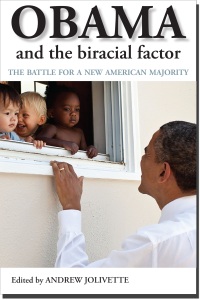Essay collection explores President Obama's biracial identity
As the United States prepared to elect its first nonwhite president in 2008, Andrew Jolivette felt something was missing.

Andrew Jolivette
"There was a lot of discussion about President Obama's background and although there was some mention of the fact that Obama was biracial, there was little analysis about what that meant," said Jolivette, the chair of SF State's American Indian Studies Department.
To provide that analysis, Jolivette collected and edited 11 essays on the topic of multiracial identity written by himself and his colleagues. The collection, "Obama and the Biracial Factor: The Battle for a New American Majority," will be released March 15. Assistant Professor of American Indian Studies Robert Keith Collins, Assistant Professor of Asian American Studies Wei Ming Dariotis and Professor of Asian American Studies Grace J. Yoo are among the SF State faculty who contributed essays.
The essays look at how Obama's biracial background has shaped the early years of his presidency, explore issues such as social justice and political reform, and challenge the reader to consider the differences between striving for a "post-racist" society and a "post-racial" one.

With U.S. demographics shifting so that no single ethnic group is in the majority, Jolivette wonders if the country will generate "a more robust democracy" in which all ethnic groups participate fully. "The book's message is that we're at this moment when, for the first time, we can build a long-term multi-ethnic coalition," Jolivette said.
Obama -- the son of a white mother and black father -- publicly identifies as African American, but Jolivette said his governing style reflects his biracial upbringing. Multiracial individuals often must work to harmonize the different parts of their background. Similarly, Jolivette said, Obama tries to unite people who are on different sides of an issue, rather than divide them.
"The messaging Obama uses is one where we can actually bring more people into the dialogue," he said. "It's not either, or. It's both, and."
Jolivette believes the book will be accessible to a general audience, not just academics. He hopes that as the 2012 presidential election approaches, readers will begin to take a more critical and accurate look at Obama's biracial identity, how that identity affects voters' perceptions.